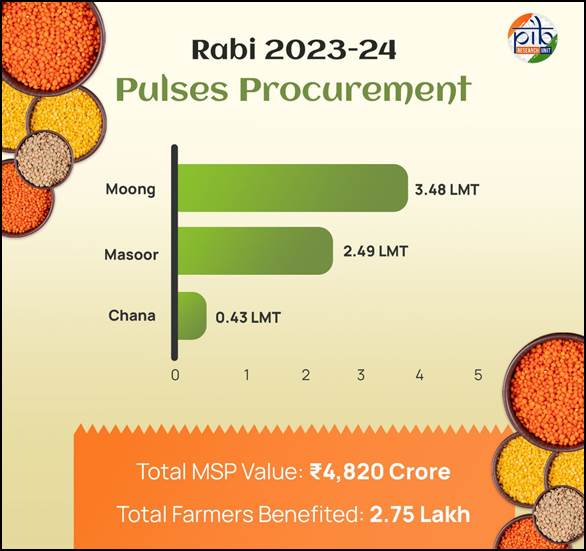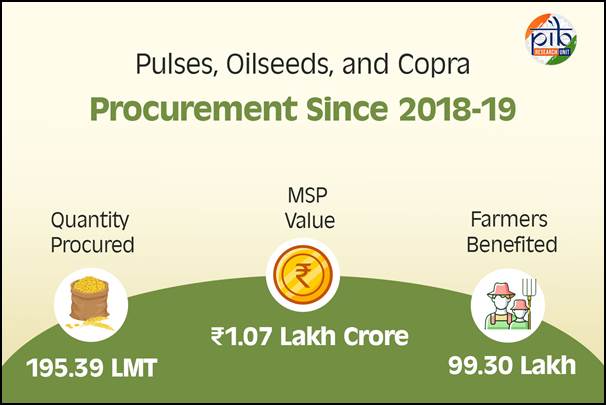Empowering Farmers Through PM-AASHA
In Rabi 2023-24, 6.41 LMT of Pulses procured, benefiting 2.75 lakh farmers
doc20241218473701The Ministry of Agriculture & Farmers Welfare has initiated several measures to help farmers to enhance their income. The Government’s MSP policy for major agricultural commodities seeks to ensure remunerative prices to the growers for their produce with a view to encourage higher investments in farming and boost production and productivity. The minimum support price (MSP) is the minimum price for select crops covering major cereals, shreeanna (millets), pulses, oilseeds, copra, cotton and jute raised in Kharif and Rabi seasons that the Government of India considers as remunerative for farmers and hence warrants price support. The government fixes MSP for 24 crops at 1.5 times the Cost of Production (CoP). Department of Agriculture & Farmers Welfare implements the umbrella scheme of Pradhan Mantri Annadata Aay SanraksHan Abhiyan” (PM-AASHA). The scheme is implemented for notified pulses, oilseeds & copra. The PM AASHA was launched in September 2018 with an aim to Provide price assurance for pulses, oilseeds and copra, ensuring financial stability for farmers, reduce post-harvest distress selling & promote crop diversification towards pulses and oilseeds. In September 2024, cabinet approved the continuation of Integrated scheme of PM AASHA with Price Support Scheme (PSS), price Deficiency Payment Scheme (PDPS) & Market intervention Scheme (MIS) as its components.
Price Support Scheme (PSS) is implemented on the request of the State Govts. / UTs that agree to exempt from levy of Mandi tax on the procurement of notified pulses, oilseeds and copra in the interest of farmers. From 2024-25 procurement season onwards, the sanction for the procurement of notified Pulses, Oilseeds and Copra under PSS are given to the State/UT initially up to a maximum of 25% of the production of the State for that particular season. Thereafter, if the State exhaust it’s limit of 25% of the State’s production, the sanction for additional procurement under PSS would be given to the State/UT up to a maximum of 25% of the national production after necessary approvals. To achieve Atmanirbharta in pulses, the procurement ceiling has been lifted in respect of Tur, Urad and Masoor for the year 24-25.
PM AASHA provides a safety net for small & marginal farmers who are most vulnerable to market fluctuations. It reduces post-harvest losses and ensures timely payment to farmers, directly improving their livelihoods. As farmers earn better prices for their commodities, it leads to economic growth in rural areas. Farmers have more confidence to avoid selling crops at lower market prices during harvest time due to price support or deficiency payment mechanisms.
The Govt. of India aggressively intervenes in the market in coordination with the States Govt. to engage the Central Nodal agencies like NAFED and NCCF with State Level agencies for undertaking the procurement of agricultural produce of the farmers at the centres set up in various parts of the country in order to ensuring effective implementation of PM AASHA Scheme for economic development and inclusive growth of farmers.
During the Rabi 2023-24 season, 6.41 LMT of Pulses of Rs 4,820 Crore of MSP value were procured from 2.75 lakh farmers which included procurement of 2.49 LMT of Masoor, 43,000 MT of Chana and 3.48 LMT of Moong at MSP to support the farmers. Similarly, 12.19 LMT of Oilseeds of Rs 6,900 Crore of MSP value were procured from 5.29 lakh farmers. During the start of ongoing Kharif season, market prices of Soyabean were ruling much below MSP prices leading to great hardship to farmers. With the intervention of GoI under PSS scheme (component of PM AASHA), the Govt. has procured (as on 11.12.2024), 5.62 LMT of Soyabean at MSP value of Rs. 2,700 Crore and benefitting 2,42,461 farmers which is the highest quantity of soyabean ever procured. This proves the unwavering commitment of the Govt. of India towards the welfare of farmers.

A look at the procurement data since 2018-19, shows that around 195.39 LMT of Pulses, Oilseeds & Copra have been procured at MSP value of Rs. 1,07,433.73 Crore benefitting 99,30,576 farmers confirming the positive impact of the scheme on lives of farmers especially small & marginal farmers.

The Government is also promoting Price Deficiency Payment Scheme (PDPS) as an option for Oilseeds. This scheme aims at ensuring remunerative price to the producers of Oilseeds whose MSP are notified by GOI. PDPS envisages the direct payment of the price difference between the MSP and the selling / modal price in notified market up to 15% of MSP value by the Central Government to the pre-registered farmers selling the oilseeds up to 40% of its production to the prescribed Fair Average Quality (FAQ) in the notified market yard through a transparent auction process within the stipulated period. However, the States/UTs have the option to implement either PSS or PDPS for the particular oilseeds for the particular year/season.
Another important and game changing component of PM AASHA is Market Intervention Scheme (MIS) meant for perishable agriculture/horticulture commodities such as Tomato, Onion and Potato etc. not covered under MSP. The scheme is implemented on the request of the State/UT Government when there is a reduction of prices in the market by at least 10% over the rates of previous normal season in the States/UTs.
Under MIS, in place of physical procurement, states may have an option to make differential payment between Market Intervention price and selling price, subject to coverage of 25% of production of crops and maximum price difference up to 25% of MIP. Further, in case of TOP crops , where there is a price difference between the production and consuming states, in the interest of the farmers, the operational costs incurred by Central Nodal agencies (CNAs) like NAFED and NCCF in storing and transporting crops from producing states to other consuming states will be reimbursed by Govt.
This scheme will immensely benefit the farmers growing price sensitive crops such as Tomato, Onion & Potato popularly known as TOP crops as the prices of these crops are highly volatile leading to hardships to farmers as well as consumers. Moreover, there is price disparity in these crops viz prices are very low in producing states in contrast to very high prices in consuming states. This scheme will therefore play a critical role in bridging the price gap and countering the effect of price volatility.
PM AASHA has emerged as a beacon of hope for crores of small and marginal farmers of the country. By providing assured incomes and stabilizing market prices, the scheme is not just a welfare measure but a step towards empowering farmers to become self-reliant. It also protects small and marginal farmers from the uncertainties of market fluctuations and intermediaries who take away the lion’s share of price for agricultural produce.














